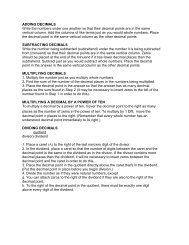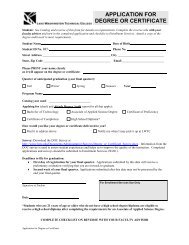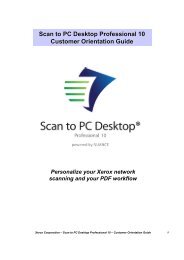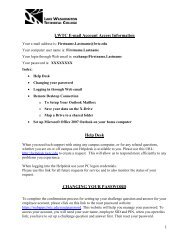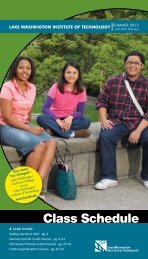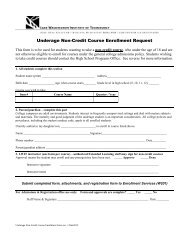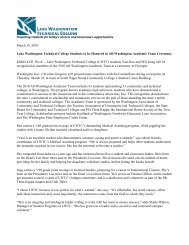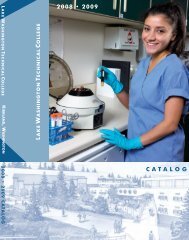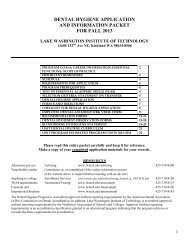2 - Lake Washington Institute of Technology
2 - Lake Washington Institute of Technology
2 - Lake Washington Institute of Technology
You also want an ePaper? Increase the reach of your titles
YUMPU automatically turns print PDFs into web optimized ePapers that Google loves.
2<br />
Programs <strong>of</strong> Study<br />
Funeral Service Education<br />
www.lwtech.edu/funeralservice<br />
Programs <strong>of</strong> Study<br />
FUNERAL SERVICE EDUCATION<br />
ASSOCIATE IN APPLIED SCIENCE DEGREE<br />
109 CREDITS<br />
Admission Dates: Fall, Spring<br />
Program Mission: The Funeral Service Education<br />
AAS degree prepares students to achieve entry-level<br />
pr<strong>of</strong>iciency as embalmers and funeral directors.<br />
Funeral service pr<strong>of</strong>essionals provide counsel, service, and<br />
emotional support for those who have experienced the<br />
death <strong>of</strong> a loved one. Students also learn how to manage a<br />
successful business in the high-tech global economy.<br />
The Funeral Service Education program at <strong>Lake</strong> <strong>Washington</strong><br />
<strong>Institute</strong> <strong>of</strong> <strong>Technology</strong> is accredited by the American Board<br />
<strong>of</strong> Funeral Service Education, 3414 Ashland Ave., Suite G,<br />
St. Joseph, MO, 64506, (816) 233-3747<br />
Funeral Service Education AAS degree graduates will:<br />
be prepared for entry level positions as a funeral<br />
director and embalmer<br />
recognize the historical roots <strong>of</strong> contemporary funeral<br />
service practices<br />
use appropriate terminology to facilitate<br />
communication with members <strong>of</strong> allied pr<strong>of</strong>essions,<br />
the public, and the funeral service industry<br />
differentiate among the representative chemicals in<br />
embalming fluid (arterial, cavity, and accessory) and<br />
describe their respective functions and chemical principles<br />
discuss and demonstrate safe environmental work<br />
practices through proper disposal <strong>of</strong> contaminated<br />
materials, and proper methods <strong>of</strong> disposal <strong>of</strong> blood and<br />
body fluids during and following the embalming process<br />
explain and demonstrate the preparation <strong>of</strong> the infant,<br />
autopsy and non-autopsy embalming techniques<br />
and procedures while demonstrating and describing<br />
the use <strong>of</strong> embalming instruments, equipment and<br />
sundries, and embalming techniques and procedures<br />
comply with OSHA’s hazard communication<br />
standard, formaldehyde standard, and bloodborne<br />
pathogens standard<br />
identify the purpose <strong>of</strong> the Federal Trade Commission<br />
(FTC), describe its effect on funeral service and who<br />
must comply with the FTC Funeral Industry Practices<br />
Rule, explain how to comply and follow the FTC Rule<br />
identify the pathological conditions and etiological<br />
factors which require special procedures in the removal,<br />
handling, preparation, and disposition <strong>of</strong> human remains.<br />
identify the laws, rules, regulations and management<br />
practices affecting funeral service and adhere to a standard<br />
<strong>of</strong> ethical behavior in personal and pr<strong>of</strong>essional conduct<br />
be prepared to succeed on the National Board Exam<br />
and the state board exam<br />
demonstrate critical thinking, teamwork,<br />
communication, intercultural appreciation,<br />
and technical and information literacy skills<br />
meet Social Science, Humanities, Written<br />
Communication, and Quantitative Reasoning<br />
distribution area outcomes<br />
The FSE program has as its central aim the recognition <strong>of</strong><br />
the importance <strong>of</strong> funeral service personnel as:<br />
members <strong>of</strong> a human services pr<strong>of</strong>ession,<br />
members <strong>of</strong> the community in which they serve,<br />
participants in the intimate relationship between<br />
bereaved families and those engaged in the funeral<br />
service pr<strong>of</strong>ession,<br />
pr<strong>of</strong>essionals knowledgeable <strong>of</strong> and compliant with<br />
federal, state, provincial/territorial, and local regulatory<br />
guidelines (in the geographic area where they<br />
practice), as well as:<br />
pr<strong>of</strong>essionals sensitive to and knowledgeable <strong>of</strong> the<br />
responsibility for public health, safety, and welfare<br />
in caring for human remains.<br />
The program has the following purposes:<br />
to enlarge the background and knowledge <strong>of</strong> students<br />
about the funeral service pr<strong>of</strong>ession.<br />
to educate students in every phase <strong>of</strong> funeral service,<br />
and to help enable them to develop the pr<strong>of</strong>iciency<br />
and skills necessary to become functional members<br />
<strong>of</strong> the pr<strong>of</strong>ession.<br />
to educate student concerning the responsibilities <strong>of</strong><br />
the funeral service pr<strong>of</strong>ession to the community.<br />
to emphasize high standards <strong>of</strong> ethical conduct.<br />
continues on next page…<br />
98<br />
2 0 1 3 - 2 0 1 4 • L A K E W A S H I N G T O N I N S T I T U T E O F T E C H N O L O G Y • C A T A L O G



